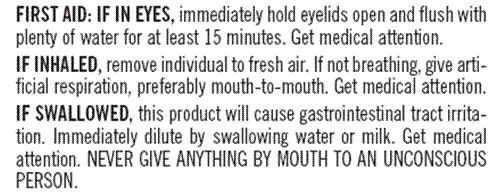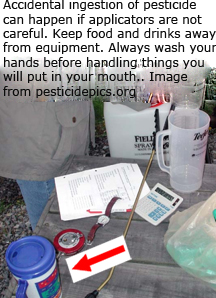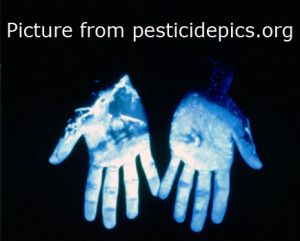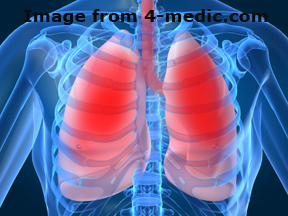How To Recognize Pesticide Poisoning:
External irritants that contact the skin may cause skin damage such as redness, itching, or
pimples. External irritants may also cause an allergic skin reaction that produces redness, swelling, or blistering. The mucous membranes of the eyes, nose, mouth, and throat are also quite sensitive to chemicals. Pesticide exposure may cause stinging and swelling in these membranes.
Internal injuries also may occur if a pesticide is swallowed, inhaled, or absorbed through the skin or eyes. Symptoms vary from organ to organ. Lung injury may result in shortness of breath, drooling (heavy salivation), or rapid breathing. Direct injury to the stomach and intestines may produce nausea, vomiting, abdominal cramps, or diarrhea. Injury to the nervous system may cause excessive fatigue, sleepiness, headache, muscle twitching, and numbness. In general, different types of pesticides produce different sets of symptoms.
If someone develops symptoms after working with pesticides, seek medical help immediately to determine if the symptoms are pesticide-related. In certain cases, blood or urine should be collected for analysis, or other specific exposure tests can be made. It is better to be too cautious than too late.
Avoid potential health problems by minimizing your exposure to pesticides. Follow all the safety recommendations in “Using Pesticides Safely and Correctly.”
When you realize a pesticide exposure has occurred or is occurring:
- Try to determine what the victim was exposed to and what part of the body was affected. –The appropriate first aid treatment depends on the kind of exposure that has occurred.
- Take action, give first aid- taking the right action is as important as taking immediate action.
- If the person is unconscious, having trouble breathing, or having convulsions, ACT FAST! Give needed first aid immediately.
- Call 911 or your local emergency service. If possible, have someone else call for emergency help while you give first aid. Have the pesticide label on hand.
- If the person is awake or conscious, not having trouble breathing, and not having convulsions, read the label for first aid (or Statement of Practical Treatment) instructions.
- Call the poison center at 1-800-222-1222.

Exposure |
First Aid |
|---|---|
| Ingestion (swallowed). Accidental oral exposure can occur when children have access to baits or other improperly stored pesticides in the home when pesticides have been put into an unlabeled bottle or food container, or when you do not wash your hands and face before eating, drinking, or smoking after application. Many pesticides are rapidly and completely absorbed by the intestinal tract causing illness and internal damage.
|
|
| Skin contact. Evidence indicates that about 97 percent of all body exposure to pesticides during a spraying operation is by skin contact. Parts of the body differ in their ability to absorb pesticides. Warm, moist areas such as the groin, armpits, head, neck, backs of hands, and tops of the feet tend to absorb more than the palms and forearms. Cuts, abrasions, sunburns and skin rashes can increase absorption as well.
|
|
| Inhalation. If inhaled in sufficient amounts, pesticides can cause contact damage to nose, throat, and lung tissue. Once breathed into the lungs, pesticides can enter the bloodstream very rapidly and completely, eventually resulting in damage to other body organs (systemic illness).
|
|
| Eye Contact. Although eyes are small, especially when compared to the volume of the skin, they can absorb a large amount of chemical and very quickly. Eyes may also be very sensitive to certain pesticides. Some pesticides when absorbed by the eyes can be corrosive and cause irreversible damage.
|
|
What To Do After First Aid
- First aid may precede but should not replace professional medical treatment. After giving first aid, call the emergency number listed on the label, and or the poison center at 1-800-222-1222. Have the pesticide label at hand when you call.
- If emergency treatment is needed in a doctor’s office or emergency room, carry the container in your trunk or flatbed away from the passengers in your vehicle. The doctor needs to know what active ingredient is in the pesticide before prescribing treatment. This information is on the label, which sometimes also includes a telephone number to call for additional treatment information.
The National Pesticide Information Center, NPIC, provides information on pesticides and how to recognize and respond to pesticide poisonings. Call NPIC toll free at 1-800-858-7378. The service operates seven days a week, from 6:30 a.m. – 4:30 p.m. Pacific Time (9:30 a.m. – 7:30 p.m. Eastern Time). If necessary, staff at NPIC can transfer your call directly to a local poison center.
NPIC staff answer questions about animal exposures, too. To keep your pets from being poisoned, follow label directions on flea and tick products carefully, and keep all pesticide containers and rodenticide baits, out of reach of pets. If you have questions about the chemicals used in flea and tick products, consult your veterinarian or the pesticide manufacturer.
For more information on first aid procedures and how to recognize a pesticide poisoning:
- Potential Health Effects of Pesticides. Penn State University.
For more information on chemical toxicity:
- Toxicity of Pesticides. 2066. Penn State University.
Compiled by Wayne Buhler, PhD.




